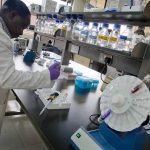As states across the country struggle to improve their economies, who can they turn to for guidance and information? How can our leaders craft more informed policies to foster economic growth, job creation, and a higher standard of living for citizens?
While there are no easy answers, policymakers, business leaders, and community members can look to a large – and largely untapped – existing resource: the wealth of knowledge and expertise present at the nation’s colleges and universities. There are 344,000 research faculty and 449,000 Ph.D. students at American higher education institutions, along with scores of researchers and experts at think tanks, nonprofit research centers, and private companies.
Each year, $65 billion is spent on research at U.S. universities and 1.66 million academic journal articles are published worldwide. The academic community behind this research contains brilliant economists, political scientists, business experts, designers, scientists, and thinkers who have devoted their careers to studying some of society’s toughest issues. A look at Footnote’s homepage provides a small glimpse of the knowledge these experts have to offer, from information on developing robotic technologies to analyses of new medical advances and healthcare policies.
The academic community can be a valuable source of ideas and insights and, in our experience, many researchers are highly motivated to see their work have an impact beyond the classroom and the university library. The challenge is to create channels connecting society’s leaders to the existing wealth of academic knowledge.
With this in mind, Footnote is taking part in an innovative project in the state of Rhode Island that brings relevant academic research and expertise directly to policymakers. The College and University Research Collaborative is a public/private partnership between the state’s higher education institutions, the Governor’s Office, the state Senate and House of Representatives, and the Rhode Island Commerce Corporation.(a) Its mission is to leverage existing resources in the state to provide evidence and expert advice that helps policymakers make more informed decisions on key economic issues.
The Collaborative launched last fall and policymakers identified three economic issues for participating scholars to focus on during its first year: regional competitiveness, advanced manufacturing, and the arts and culture economy. Faculty from Rhode Island colleges and universities are conducting small research projects on these topics to produce findings that are relevant to current policy discussions.(b) Footnote is collaborating with participating scholars on articles and research briefs that will make the findings accessible to policymakers and community members.
The Collaborative offers a unique opportunity for academics in Rhode Island to broaden the impact of their work using an action research approach. Action research invites the intended users of research findings, such as policymakers, to participate in setting the agenda and guiding the research process. The goal of this approach is to produce knowledge that is more immediately applicable to the needs and concerns of the community outside academia.
By linking policymakers and academics with the shared goal of improving Rhode Island’s economy, The Collaborative fosters engaged scholarship and informed political decision making. We believe the knowledge of professors and researchers can promote evidence-based policymaking and progress toward a more vibrant economy, in Rhode Island and around the country.
You can learn more about The Collaborative and view other articles from the project on Footnote.
Sidenotes
- (a) The colleges and universities participating in The Collaborative are: Brown University, Bryant University, Community College of Rhode Island, Johnson and Wales University, New England Institute of Technology, Providence College, Rhode Island College, Rhode Island School of Design, Roger Williams University, Salve Regina University, and University of Rhode Island.
- (b) Among many economic challenges, RI has the second highest unemployment rate in the U.S. – 9.2% compared to the national rate of 7.3%. It led the country in manufacturing job loss from January 2000 to January 2013, shedding 44% of manufacturing jobs during that period.





